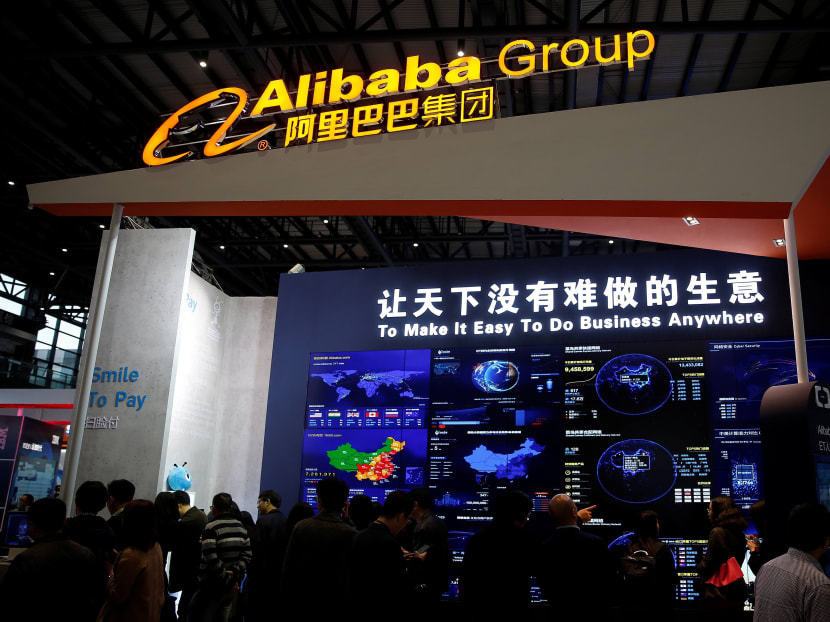The world’s biggest tech companies are no longer just American
HONG KONG — The technology world’s US$400 billion (S$545 billion) and up club – long a group of exclusively American names like Apple, Google, Facebook, Microsoft and Amazon – needs to make room for two Chinese members.

The Alibaba Group is now among the world’s most highly valued public companies, and is twice as valuable as tech stalwarts such as Intel, Cisco and IBM. Photo: Reuters
HONG KONG — The technology world’s US$400 billion (S$545 billion) and up club – long a group of exclusively American names like Apple, Google, Facebook, Microsoft and Amazon – needs to make room for two Chinese members.
The Alibaba Group and Tencent Holdings, Chinese companies that dominate their home market, have rocketed this year to become global investor darlings. They are now among the world’s most highly valued public companies, each of them twice as valuable as tech stalwarts such as Intel, Cisco and IBM.
While American technology giants dominate people’s online lives in Western countries, Tencent and Alibaba have soared by essentially carving up China, the world’s single largest Internet market with more than 700 million online users. That is roughly twice the size of the population of the United States. Chinese people also spend more money online than Americans.
Their surge, which has taken place inside a tightly controlled Internet space that has blocked international companies like Facebook, has increasingly set them apart from the rest of China. Despite headline numbers that suggest stable growth, the Chinese economy is grappling with many problems, including heavy debt and continued reliance on rusty industries like steel.
Yet Alibaba and Tencent this week both reported financial results that blew past investor expectations, suggesting the future of the Chinese technology world is bright.
Their rise is emblematic of a rebalancing of global technological influence. In recent years, places from Paris to Seoul have claimed the mantle of the next Silicon Valley. Yet the cluster of fast-growing startups and Internet behemoths coming out of China has emerged as the one true rival in scale, value and technology to the West Coast homes of the American technology renaissance.
“We’ve come to the point where China has finally caught up with the US in the internet space,” said Mr Hans Tung, a managing partner at venture capital firm GGV Capital.
In Hong Kong, Tencent’s market capitalisation rose above US$400 billion in early trading on Thursday (Aug 17) before closing just below that threshold at US$396 billion. Alibaba closed in New York trading on Thursday with a market value of US$415 billion. The two companies still lag behind Amazon and Facebook, which are valued at more than US$450 billion, and are significantly smaller than Apple, the world’s most valuable public company with a market capitalization exceeding US$800 billion.
Alibaba and Tencent owe part of their success to China’s censorship and suspicion of foreign tech firms, which has kept American giants like Facebook and Amazon out of their orbit. But the two have also scored some major technology innovations in their own right.
They dominate a smartphone culture that in many ways is superior to that of the US. Chinese people use their dueling mobile payment systems to settle their restaurant tabs, to shop online, to pay their utility bills, to rent bicycles and even to put money into investments.
Despite their size, Alibaba and Tencent are mostly anchored in China, though both are pushing to expand. Most of Alibaba’s earnings come from its ad and commissions business in China. The company had just under US$400 million in revenue from international commerce. While Tencent has games like “League of Legends” that are played across the world, the bulk of its revenue comes from games and ads in China.
Both have made use of investments and acquisitions to enter into new markets in recent years – with uneven results. Alibaba has invested in a payments company in India, and bought into three different e-commerce companies in South-east Asia. With Amazon also readying its own South-east Asian campaign, the hugely populated region of disparate cultures could be the first place the two e-commerce Goliaths compete face-to-face on neutral ground.
Last year, Tencent paid US$8.6 billion for Supercell, the maker of the hugely popular smartphone game “Clash of Clans”. Tencent also wanted to buy the global messaging app WhatsApp, but was outmanoeuvred by Facebook.
The two companies and other Chinese technology names have also opened Silicon Valley research centres and become prominent investors in cutting-edge start-ups. They both have backed a Chinese rival to Uber called Didi Chuxing, which trounced the US company in China and is now expanding in other markets. Tencent has been an investor in Snap, the maker of the messaging app Snapchat, and owns some of the world’s most popular games.
Even with their new pre-eminence, Tencent and Alibaba face some daunting challenges. China’s Internet world cannot grow forever, and both companies have stumbled in many of their efforts to get their popularity at home to translate into success in the United States and other markets.
Both have made expensive forays into Hollywood with lacklustre results. And they face rising pressure from a Chinese government that has become increasingly aware of the power of digital information – and has plans to use it to better track its populations.
Still, there is an opportunity for the companies to emerge as global leaders in areas like gaming, e-commerce and communications, said Mr David Chao, co-founder of venture capital firm DCM Ventures. “They’re a legitimate force to be reckoned with on the world stage,” he said. THE NEW YORK TIMES





